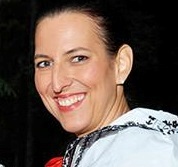Can You Outsmart Your Smarts?
Eva Trumpešová-Rudolfová, Czech Republic
Eva Trumpešová-Rudolfová teaches ESP and EAP at Masaryk University Language Centre, Brno, Czech Republic, where she is also a passionate member of English Autonomously team and a counsellor. She is an ardent ambassador of life skills and in her lessons she promotes cooperation, effective communication, critical thinking, creativity, learning skills, self-reflection and emotional intelligence.

Menu
Introduction
Lesson Outline
Conclusion
References
In language classrooms, we very often see students, who consider themselves not very lucky in terms of language learning gifts and they deal with it in different ways. The most common two are sheer effort and hard work, not necessarily directly proportional to the result; or resignation to their subjective reality that, for them, spells not being talented for languages…
As I like to break un-useful patterns of my students, I tend to include this lesson anytime I want to concentrate on the topic: How to become a better language learner. Students find out about their own strengths and weaknesses in learning and try to come up with ways to consciously work with them. Other skills they practice are oral communication, team work, writing, reflection, reading comprehension, acquiring vocabulary related to learning, critical thinking, creativity, emotional intelligence, social skills and many others.
I have always used this activity with university students, of approximately B2 level. However, I believe it can be used much more widely, when adjusted adequately. As for number of students, and the time needed, this can be accommodated according to the needs and requirements. The teacher plays the role of a facilitator at every stage.
The lesson relies heavily on the book You Are Smarter Than You Think by Thomas Armstrong and therefore it is a vital part of it. Even though the book is meant for children, it serves its purpose here very well from the language as well as learning point of view. I am not including any page numbers as the book needs to be studied in its entirety.
Warm-up: In pairs or small groups Ss share their ideas about their talents and gifts, about their intelligence, they are given a set of Qs based on their level and field of study (for example: What are your talents and gifts? Do you need them at this faculty, at your field of study? Have you chosen your field of study to use your talents? What do you tend to do if a subject you need to pass is absolutely not your talent? Do you need to be intelligent to study your field? What if somebody wasn´t, would they be able to study here nevertheless?)
Class Input: Based on the warm-up, T asks questions about intelligence, controversial if possible (e.g. Do you believe you are intelligent? What do you need it for? Are all people intelligent? All students? All scientists or doctors? What is it, then, to be intelligent?), leading to the idea that everybody is intelligent, but in a different way. The concept of Multiple Intelligences (Howard Gardner) is introduced using information given on http://multipleintelligencesoasis.org/. I do not like to go into detail, as the students will find themselves very shortly, so I just introduce the different intelligences. Then, Ss try to guess their strong intelligences in writing (quiet reflection, 3 mns) and share (voice) it with a partner, adding a reason WHY they think so.
Individual work: Ss go around classroom, going through checklists of individual intelligences or Smarts, as they are called in the book You Are Smarter Than You Think that is used for this purpose. The checklists are taken from the above mentioned book and are distributed around the classroom. Brief class check-up – was there anything surprising in the Qs or your results? Were you right in guessing your strengths?
Group Work: Ss, who are “Smart” in the same way work together in teams generating ideas on “How to be more Word Smart using my kind of Smart-ness” (In case there are six or more Ss of the same intelligence, I split them into two groups). They write ideas or key words on pieces of paper (e.g. If you are Music smart, read silly poetry aloud etc.) so as to create a mind-map on the floor with the other groups later. For this purpose, one S in every group has to be a spy, making sure that the ideas do not duplicate in groups. T might want to monitor the work asking the Ss to clarify and specify.
Class Work: Creating a final mind-map on the floor as a class with the title: How to Be More Word Smart using anything they wish to connect and highlight some of the ideas. Ss at this point already have the knowledge of working with mind maps. (If they don´t, such a lesson or introduction would have to precede.) If the T wishes, he or she can provide more ways based on his or her experience or the book mentioned above.
In learning, it is very important for the students to know, what their strengths and weaknesses are and how they can work with that. It is also very useful to show them that not being very good in the linguistic domain does not mean they are not intelligent, nor does it mean they cannot get better. Working together with other students of the same and then different kind promotes community learning and has a bigger long-term impact than just providing students with a list of tips for improvement.
Armstrong T (2002). You Are Smarter Than You Think. Minneapolis: Free Spirit Publishing
Official Authoritative Site of Multiple Intelligences. multipleintelligencesoasis.org [online]. © 2015 [2015-10-10]. Available from http://multipleintelligencesoasis.org/

Please check the Creative Methodology for the Classroom course at Pilgrims website.
Please check the Teaching English Through Multiple Intelligences course at Pilgrims website.


|